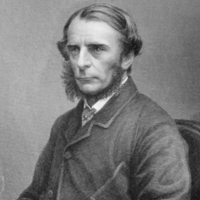The Bad Squire
The merry brown hares came leaping
Over the crest of the hill,
Where the clover and corn lay sleeping
Under the moonlight still.
Leaping late and early,
Till under their bite and their tread
The swedes and the wheat and the barley
Lay cankered and trampled and dead.
A poacher’s widow sat sighing
On the side of the white chalk bank,
Where under the gloomy fir-woods
One spot in the ley throve rank.
She watched a long tuft of clover,
Where rabbit or hare never ran;
For its black sour haulm covered over
The blood of a murdered man.
She thought of the dark plantation,
And the hares, and her husband’s blood,
And the voice of her indignation
Rose up to the throne of God.
‘I am long past wailing and whining–
I have wept too much in my life:
I’ve had twenty years of pining
As an English labourer’s wife.
‘A labourer in Christian England,
Where they cant of a Saviour’s name,
And yet waste men’s lives like the vermin’s
For a few more brace of game.
‘There’s blood on your new foreign shrubs, squire,
There’s blood on your pointer’s feet;
There’s blood on the game you sell, squire,
And there’s blood on the game you eat.
‘You have sold the labouring-man, squire,
Body and soul to shame,
To pay for your seat in the House, squire,
And to pay for the feed of your game.
’You made him a poacher yourself, squire,
When you’d give neither work nor meat,
And your barley-fed hares robbed the garden
At our starving children’s feet;
‘When, packed in one reeking chamber,
Man, maid, mother, and little ones lay;
While the rain pattered in on the rotting bride-bed,
And the walls let in the day.
’When we lay in the burning fever
On the mud of the cold clay floor,
Till you parted us all for three months, squire,
At the dreary workhouse door.
‘We quarrelled like brutes, and who wonders?
What self-respect could we keep,
Worse housed than your hacks and your pointers,
Worse fed than your hogs and your sheep?
’Our daughters with base-born babies
Have wandered away in their shame,
If your misses had slept, squire, where they did,
Your misses might do the same.
‘Can your lady patch hearts that are breaking
With handfuls of coals and rice,
Or by dealing out flannel and sheeting
A little below cost price?
’You may tire of the jail and the workhouse,
And take to allotments and schools,
But you’ve run up a debt that will never
Be paid us by penny-club rules.
‘In the season of shame and sadness,
In the dark and dreary day,
When scrofula, gout, and madness
Are eating your race away;
’When to kennels and liveried varlets
You have cast your daughter’s bread,
And, worn out with liquor and harlots,
Your heir at your feet lies dead;
‘When your youngest, the mealy-mouthed rector,
Lets your soul rot asleep to the grave,
You will find in your God the protector
Of the freeman you fancied your slave.’
She looked at the tuft of clover,
And wept till her heart grew light;
And at last, when her passion was over,
Went wandering into the night.
But the merry brown hares came leaping
Over the uplands still,
Where the clover and corn lay sleeping
On the side of the white chalk hill.
Eversley, 1847.
From Yeast.

